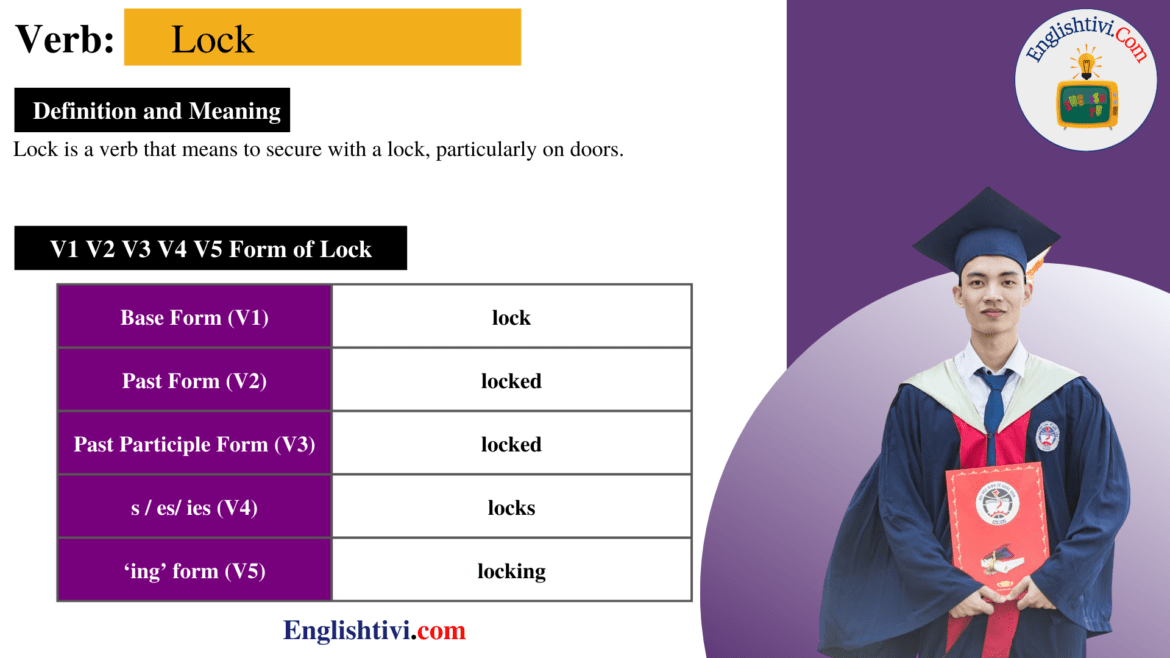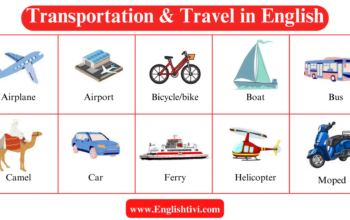Lock V1 V2 V3 V4 V5 is one of the verbs that are used very commonly in English tests as well as in everyday communication. Also, because it’s an irregular verb, lock doesn’t follow the regular rule. The verb “lock” has five different forms: base form, past simple, past participle form, present perfect, and present perfect participle. So what is lock‘s past? How do conjugate verbs with lock verbs?
⏩ Sign Up to Get Bonus
Let’s find out with English tivi in the article below.
See more at: Verbs
Lock of Definition and Meaning
Lock is a verb that means to secure with a lock, particularly on doors.
V1 V2 V3 V4 V5 Form of Lock
| Base Form (V1) | lock |
| Past Form (V2) | locked |
| Past Participle Form (V3) | locked |
| s / es/ es (V4) | locks |
| ‘ing’ form (V5) | locking |
Lock of Past Simple V2
The verb Lock is also employed in its V2 form as “locked”’. It is used to indicate the past tense in sentences.
Lock of Past Participle V3
The V3 form is identical to the V2 form. The V3 form is “locked”. Locked is used in the past or present perfect tense.
+ In the present perfect tense, we use the word V1 as ‘have + locked‘ or ‘has + locked'.
- I, you, and we are used as ‘have + locked‘.
- ‘has + locked' is used for he, she, and it.
+ If you need to use the past perfect tense, use ‘had + locked‘ regardless of the subject.
You might also like: ALL the English Grammar Basics You Need
Conjugation of Lock V1 V2 V3 V4 V5
| Conjugation table: Lock | |||
| Number | Singular | ||
| Present Simple of lock | I | You | She/He/It |
| lock | lock | locks | |
| Plural | |||
| We | You | They | |
| lock | lock | lock | |
| Present Continuous of lock | I | You | She/He/It |
| am locking | are locking | is locking | |
| Plural | |||
| We | You | They | |
| are locking | are locking | are locking | |
| Present Perfect of lock | I | You | She/He/It |
| have locked | have locked | has locked | |
| Plural | |||
| We | You | They | |
| have locked | have locked | have locked | |
| Present Perfect Continuous of lock | I | You | She/He/It |
| have been locking | have been locking | has been locking | |
| Plural | |||
| We | You | They | |
| have been locking | have been locking | have been locking | |
| Past Simple of lock | I | You | She/He/It |
| locked | locked | locked | |
| Plural | |||
| We | You | They | |
| locked | locked | locked | |
| Past Continuous of lock | I | You | She/He/It |
| was locking | were locking | was locking | |
| Plural | |||
| We | You | They | |
| were locking | were locking | were locking | |
| Past Perfect of lock | I | You | She/He/It |
| had locked | had locked | had locked | |
| Plural | |||
| We | You | They | |
| had locked | had locked | had locked | |
| Past Perfect Continuous of lock | I | You | She/He/It |
| had been locking | had been locking | had been locking | |
| Plural | |||
| We | You | They | |
| had been locking | had been locking | had been locking | |
| Future Simple of lock | I | You | She/He/It |
| will/shall lock | will/shall lock | will/shall lock | |
| Plural | |||
| We | You | They | |
| will/shall lock | will/shall lock | will/shall lock | |
| Future Continuous of lock | I | You | She/He/It |
| will/shall be locking | will/shall be locking | will/shall be locking | |
| Plural | |||
| We | You | They | |
| will/shall be locking | will/shall be locking | will/shall be locking | |
| Future Perfect of lock | I | You | She/He/It |
| will/shall have locked | will/shall have locked | will/shall have locked | |
| Plural | |||
| We | You | They | |
| will/shall have locked | will/shall have locked | will/shall have locked | |
| Future Perfect Continuous of lock | I | You | She/He/It |
| will/shall have been locking | will/shall have been locking | will/shall have been locking | |
| Plural | |||
| We | You | They | |
| will/shall have been locking | will/shall have been locking | will/shall have been locking | |
| Conditional Present of lock | I | You | She/He/It |
| would lock | would lock | would lock | |
| Plural | |||
| We | You | They | |
| would lock | would lock | would lock | |
| Conditional Perfect of lock | I | You | She/He/It |
| would have locked | would have locked | would have locked | |
| Plural | |||
| We | You | They | |
| would have locked | would have locked | would have locked | |
| Conditional Present Continuous of lock | I | You | She/He/It |
| would be locking | would be locking | would be locking | |
| Plural | |||
| We | You | They | |
| would be locking | would be locking | would be locking | |
| Conditional Perfect Continuous of lock | I | You | She/He/It |
| would have been locking | would have been locking | would have been locking | |
| Plural | |||
| We | You | They | |
| would have been locking | would have been locking | would have been locking | |
| Present Subjunctive of lock | I | You | She/He/It |
| lock | lock | lock | |
| Plural | |||
| We | You | They | |
| lock | lock | lock | |
| Past Subjunctive of lock | I | You | She/He/It |
| locked | locked | locked | |
| Plural | |||
| We | You | They | |
| locked | locked | locked | |
| Past Perfect Subjunctive of lock | I | You | She/He/It |
| had locked | had locked | had locked | |
| Plural | |||
| We | You | They | |
| had locked | had locked | had locked | |
| Imperative of lock | I | You | She/He/It |
| lock | |||
| Plural | |||
| We | You | They | |
| Let’s lock | lock | ||
See more at: Vocabulary
Example Sentences with Lock V1 V2 V3 V4 V5
In this section, we will learn about lock sentence examples:
- He kept the sensitive documents locked up in his file cabinet.
- If you don't lock your automobile, it will be stolen.
- Wait a minute, I‘m locking the gate.
- Important things, she locks them carefully.
- My mother has always locked the door carefully since the house was stolen.
Synonym Words For Lock
Synonym of lock word list. Here are a variety of words whose meaning is nearly the synonym of lock:
- bolt
- bar
- secure
- fasten
- seal
- latch
- chain
- padlock
- clamp
- close
Opposite Words For Lock
The antonym of lock word list. Here are some words that have nearly the opposite meaning as lock:
- unlock
- open
- unlatch
- unbolt
- unbar
- unclose
- unhook
- unshut
- pop
You might also like: Best List of Irregular Verbs in English
Some Frequently Asked Questions About Lock (Verb)
What is the V1 V2 V3 V4 V5 of lock?
The past tense of lock is locked. The third-person singular simple present indicative form of lock is locks. The present participle of lock is locking. The past participle of lock is locked.
| Base Form (V1) | lock |
| Past Form (V2) | locked |
| Past Participle Form (V3) | locked |
| s / es/ es (V4) | locks |
| ‘ing’ form (V5) | locking |
What is the V2 and V3 form of lock?
+ The V2 and V3 form of lock is “locked“.
What is the sentence of lock?
What is the past tense V2 of lock?
+ The past tense of lock is “locked“.
What is the past participle V3 of lock?
+ The past participle of lock is “locked“.
What is the present participle V5 of lock?
+ The present participle of lock is “locking“.
Conclusion
Let’s learn with English TV the structure of the verb “Lock V1 V2 V3 V4 V5“: Base Form, Past Simple, Present Continuous and Present Continuous and Present Continuous and Present Continuous forms. We wish you all the best of luck.
You should subscribe to the English TV YouTube channel if you want to learn more about the English language and improve your proficiency.





